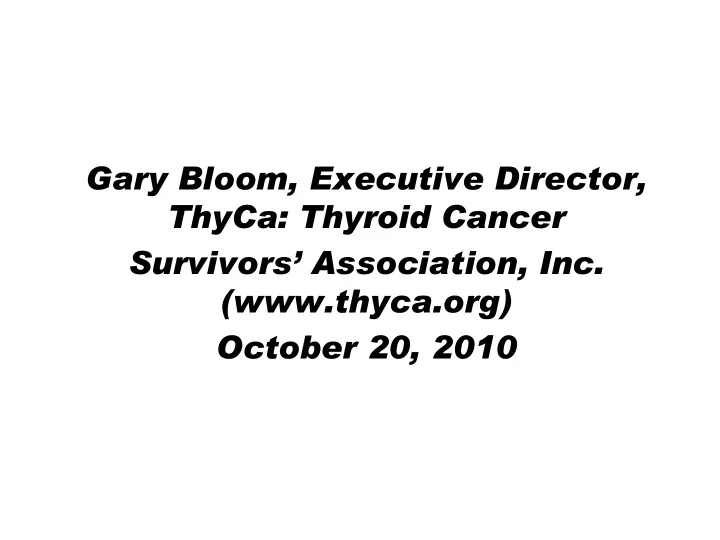

Gary Bloom, Executive Director, ThyCa: Thyroid Cancer Survivors’ Association, Inc. (www.thyca.org) October 20, 2010
• Executive Director of ThyCa: Thyroid Cancer Survivors’ Association (ThyCa), a non-profit patient organization, representing more than 22,000 people. • Thyroid cancer survivor who had 5 treatment doses of Radioactive Iodine within a 3 year period. www.thyca.org
Thanks to James Luehman, one of this morning’s speakers, who participated at this year’s 13 th International Thyroid Cancer Survivors’ Conference on behalf of the NRC. www.thyca.org
Why am I here? www.thyca.org
Consider the following questions: • What instructions are the patients given, oral and/or written? • How does the dosing hospital determine who is safe to discharge after dosing? • Who is released after radioactive iodine, how quickly, and after what dose? • Do patients drive themselves home or take public transportation, exposing others? • Do they go home or to a hotel? www.thyca.org
What resolution would ThyCa like? www.thyca.org
ThyCa does not advocate that everyone treated with Radioactive Iodine need be isolated for 1, 2 or 3 nights. • Facilities need to adhere to standard instructions/questionnaires in evaluating who can or can’t be released from the dosing facility. • Facilities need to address the issues of private housing and transportation versus commercial. www.thyca.org
ThyCa recently developed an online survey with regards to RAI issues. • presented to 15,000 survivors • 2,421 participants responded • 1,551 had one or more outpatient RAI • 147 of the 1,483 who answered had vomiting (9.95%) • 67 participants (4.5%), reported vomiting within the first 4 hours of I-131 www.thyca.org
Compromise between immediate release and overnight (or longer) isolation is holding people for a period of hours before release to insure no nausea and/or vomiting. For most patients, holding the patient for 3-4 hours will ensure that the RAI has been absorbed. NCRP 155 addressed this very option. www.thyca.org
It is time for action! • Update standard written instructions to be easier to read, and understand • Make instructions available in a number of languages for the same reason • Develop a script for oral instructions. This redundant effort is necessary. • Consider different languages, and level of understanding (keeping in mind the patient may be extremely hypothyroid). www.thyca.org
I invite all of you to join us at next year’s 14 th International Thyroid Cancer Survivors’ Conference: Los Angeles, California October 14-16, 2011 Interested in attending? Contact me at: gbloom@thyca.org, or 301-943-5419. www.thyca.org
Recommend
More recommend